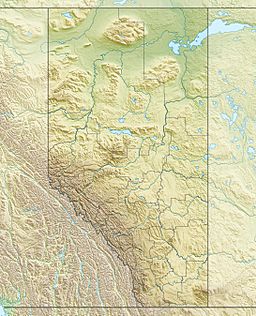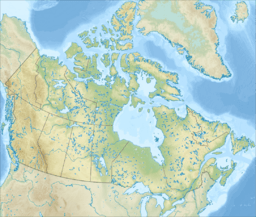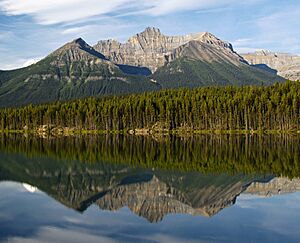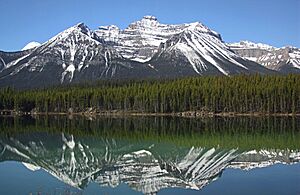Mount Niblock facts for kids
Quick facts for kids Mount Niblock |
|
|---|---|
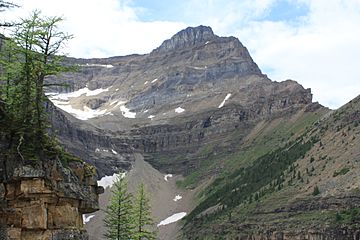
Mount Niblock, August 2012
|
|
| Highest point | |
| Elevation | 2,976 m (9,764 ft) |
| Prominence | 142 m (466 ft) |
| Listing | Mountains of Alberta |
| Geography | |
| Parent range | Bow Range (Canadian Rockies) |
| Topo map | NTS 82N/08 |
| Climbing | |
| First ascent | 1899 by Walter Wilcox |
| Easiest route | Moderate scramble |
Mount Niblock is a tall mountain located in Banff National Park in Alberta, Canada. It stands proudly near the famous Lake Louise. This mountain was named in 1904 after John Niblock. He was a superintendent for the Canadian Pacific Railway. John Niblock helped encourage people to visit the beautiful Canadian Rockies. He also helped name some train stops in Western Canada.
Contents
Exploring Mount Niblock
Mount Niblock is a popular spot for scrambling in the Lake Louise area. Scrambling is like hiking, but it involves using your hands sometimes to climb over rocks. It's a fun way to explore the mountains!
Best Time to Visit
The best time to climb Mount Niblock is from July to September. During these months, the usual path is mostly free of snow. If you try to climb in spring or early summer, there might be a risk of avalanches. An avalanche is a large slide of snow down a mountain.
How to Reach the Mountain
To get to Mount Niblock, you can start your adventure near the Chateau Lake Louise. Follow the trail that passes by Mirror Lake. Then, you will reach Lake Agnes. Walk along the right side of Lake Agnes until you reach the far end. The trail will then turn left towards a spot called Big Beehive. From here, you will find a clear path. This path leads to the lower rocky slopes and small cliffs of Mount Niblock.
What are Mountains Made Of?
Like other mountains in Banff Park, Mount Niblock is made of sedimentary rock. This type of rock forms from layers of sand, mud, and tiny bits of sea creatures. These layers were laid down over millions of years, from the Precambrian to the Jurassic periods. Imagine ancient shallow seas covering this area!
Later, during an event called the Laramide orogeny, these rock layers were pushed up. This powerful force created the mountains we see today.
Mountain Weather
Mount Niblock is located in a subarctic climate zone. This means it has cold, snowy winters. The summers are usually mild. Temperatures can drop very low, sometimes below −20 °C. With the wind chill, it can feel even colder, below −30 °C. So, if you visit in winter, dress very warmly!
Nearby Mountains to Explore
 | Calvin Brent |
 | Walter T. Bailey |
 | Martha Cassell Thompson |
 | Alberta Jeannette Cassell |


